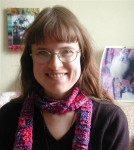
Justin Zinck
Justin Zinck is a young writer from the suburbs of Boston, Massachusetts. Among other places, he has lived in Granada, Spain and Aspen, Colorado, and now spends most of the year in Illinois, where he is seeking his MFA in Fiction.
Jenny Finds a New Man
Jenny stepped out of the rain and into the golden glow of one of Boston’s finest restaurants. The air smelt of garlic and olives in Magioni’s, of hot-sanded coasts and cities hard to pronounce. Jenny closed her eyes and inhaled deeply, ushering the restaurant’s scent deeper into her nose with a rising palm. She looked up and admired the chandeliers, the smiling hostess at the dining room’s entrance. The young woman wore a dress so black and so elegantly conforming to the curves of her body that it seemed painted on, tailored in ink. Jenny nodded in approval. This is nice, she thought. Sexy. Chic.
The fact that Magioni’s was probably the nicest restaurant Jenny had ever stepped foot in seemed right to her at that moment: after all, she had waited a long time to be on this date. She had purposely precluded it by too much moral wrestling, weighing the considerable mass of this question: After your husband dies in a zombie apocalypse, how long is long enough before you can go to bed with another man?
For months, Jenny’s informational pamphlet for Boston Singles: New England’s Premier Dating Service had sat neglected. A friend had ordered it on Jenny’s behalf in the winter following Sachs’s death, when, after a bottle of wine at the Boston Physical Therapists Annual Christmas Banquet, Jenny had coaxed herself into hysterics in front of hundreds, laid face down on the parquet dance floor and exonerated her grief in whale-like bursts.
Cynthia, Jenny’s office mate and a joint specialist, had peeled her off of the lacquered wood and brought her into the bathroom. There she sat Jenny on a toilet. “You need a man, Jenny. You hear me? It’s crazy out there. You need a man.”
Jenny nodded her head yes. Mascara ran in tendrils onto the pads of her cheeks, and Jenny watched Cynthia pull her own copy of the Boston Singles pamphlet from her purse and hold it two handed, like a trophy, for her to see.
“He’s dead, Jenny!” Cynthia yelled—he referring to Sachs. Cynthia motioned toward the dance floor on the other side of the wall. She spoke solemnly and began to cry. “A lot of the good ones are.”
Hastily, Jenny agreed to sign up. The following Tuesday, however, when her copy of the brochure arrived, it was immediately exiled to the stainless steel refrigerator, where its pages collected the leaky freezer’s chill. While Jenny would flip through the catalog without conviction from time to time in the months thereafter, when she really considered the information – Boston’s finest young human bachelors!…Average salary $70,000+ – she immediately reminded herself to be appalled, and forced forward thoughts of Sachs and matrimonial duty.
For two years Jenny kept up her self imposed asexual grief, and it wasn’t until the fifteenth month after Sachs got eaten, in a Quiznos, that Jenny failed to keep up appearances. The man, who wore a corduroy sport coat and had broad shoulders, caught her interest while ordering.
Upon seeing this man – who was a total stranger—Sachs’s memory plummeted out of Jenny with frightening speed. She ran her tongue across the back of her teeth to avoid yelling, and she carried this new fire, the refusal to deny herself, where it grew and grew from months sixteen and twenty three.
Finally, she awoke on the two-year anniversary of her husband’s failed heroics and couldn’t take it any longer. Jenny admitted what she always suspected: Sachs was an asshole. The charade was over, and she felt on this morning an overwhelming desire to be fucked. She wanted to be used like a bowl of water, drank from and lapped by a human tongue, and also, to do the same to another.
Without deliberation, Jenny leapt from her mattress, ran into the kitchen and called Boston Singles. She told the operator to make a date, and to do so quickly. The operator told Jenny to show up at Magioni’s a week from then, 9 p.m., and to dress nicely.
“What will his name be?” Jenny asked.
“Francis Blinkeley,” the operator replied. Without bothering to imagine what this Francis Blinkeley might look like, Jenny imagined him wonderful, exactly what she needed.
* * *
The hostess handed Jenny a hanger for her coat, but Jenny refused. “Your reservation, ma’am?”
Jenny hesitated. “Jenny Hadsonn. Jenny Hadsonn- Wheeler.” She watched the pretty girl drag a pen down her date book. The pages were gold lined, heavy gauge papyrus.
“Good evening, Ms. Hadsonn. For two, now?”
Jenny tried on a seductive voice for practice, but it felt thick and cold, like a block of ice lodged in her throat. “Yes.”
As the hostess led Jenny into the bar, she spoke over her shoulder. “Mr. Blinkley just called, Ms. Hadsonn. He’s running a bit late. Please, do let him buy you a drink.”
Jenny hadn’t been sitting for thirty seconds when a man beside her started coughing intentionally. She and the man met eyes, and when he spoke his voice was high-pitched, nearly identical to Sachs’s. The sound of the man’s voice made the bar spin; Jenny was angered by the coincidence, and Sachs’s death, which was like a bad movie, came into focus against Jenny’s will: she saw her muscular husband running onto the porch with a pitchfork; Sachs trying to stab the full-blown zombie in the face; the family dog hanging from the zombie’s lips (he was a tall one); Sachs slipping; Sachs falling down; Sachs getting his brains eaten.
Jenny chugged her Long Island and fought to keep the alcohol down. After two years, Jenny still hated Sachs for dying like that.
“You know why they call it Long Island Ice Tea?” the man asked, firing up a lamentable joke. “You know what else is long?”
Jenny tired to ignore the man. She took twenty deep breaths – a habit — and looked around Magioni’s. She ordered another Long Island, and Jenny formed Blinkeley’s name on her tongue for what must have been the thousandth time that week. “Mr. Blinkeley,” she muttered. “B-L-I-N-K-E-L-E-Y.”
The man beside her shifted his weight, soliciting a groan from the bar stool. He was confused. “Excuse me?” he asked.
Jenny blinked. “A cigarette.”
The man reached into his pocket and produced a cigar. “This is all I have.”
“Thanks,” Jenny said, reaching for the tube. She slid it into her purse, saving it for later. She showed the bartender two fingers, signaling another drink. She concentrated on drinking faster.
* * *
Before he had realized that he had mistaken the date and was late for his Boston Singles engagement, and before he’d gotten into the front seat of his very expensive sports coupe, Francis Blinkley, a former executive vice president at the hedge fund management firm Bart and Styles, and bonified half-zombie, was chewing the liver out of a human carcass in Jamaica Plain’s Arnold Arboretum.
The kill wasn’t his. Blinkeley had ridden his bike out of the Back Bay and into Jamaica Plain to get some fresh air, to clear his head and rehearse his words for what he supposed was the following night.
“Hi, I’m Fran,” he was saying into the base of a Norwegian Fir. Blinkeley pointed toward his chin and gave a few seconds of faux pause to allow the reality of the situation to settle in on the poor woman he would be meeting. “Oh yeah, well let me explain this…” he continued, referring to the engorged cherry red lips; the opaque, vein riddled skin; the yellow teeth and the sunken, jaundiced eyes that made up his face.
As Blinkeley fidgeted, even in rehearsal, he picked up the carcass’s scent: meat, spoiled eggs, and the sulfurous chalk of bird shit. The more human side of Blinkeley – the side repulsed by the idea of eating a human, the side that was supremely deft with numbers – lost out to his zombie id, which compelled him into the nearby bushes, where the body sat.
As he ate the liver, bile beaded onto Blinkeley’s fluorescent, Road Safe!Ò windbreaker. The liquid was the same color as a deep bruise, and Blinkeley was halfway through the rubbery organ – which had the texture of a Converse All Star – when his cell phone rang.
Blinkeley frowned. His wife and children were dead. His parents and brothers had stopped calling him once they learned of his half-zombie state; he had been fired by Bart and Styles for logistics and safety concerns; who, Blinkeley thought, could possibly be calling me?
Blinkeley put the liver onto the cement and dragged his finger across the touch screen of his Iphone, leaving a wake of slime on the glass. “Hello?” he asked. His voice was still deep, human and intelligible. The vaccine had saved that, at least.
A woman’s voice responded. “Mr. Francis Blinkeley. We are calling to remind you of your Boston Singles engagement on-” a robotic voice interrupted, “Today. Saturday. March Fifth. At. Nine P.M Eastern Time. –” the woman recommenced, “if you have questions, or need to cancel, please call your date, or the establishment at which you are meeting. Thank you.”
Blinkeley hung up the phone and swore. He looked at the clock on the phone, and then the liver. Blinkeley began to run to his bike, then stopped and retreated, picked up the liver and took one last bite. It hurt half of him to leave the organ, and as he rode into the street, he couldn’t help but look back. Atop of the corpse’s chest, Blinkeley saw a single pigeon prancing about, the bird nearly blending into the gray dusk behind it, cooing hello to the impening night.
* * *
Jenny was already drunk – really drunk – when Blinkeley crept up to the bar and tapped her on the shoulder. The finger’s action was heavy but quick on her bone, dropping like urgent pecks on a telegraph pad. Beside Jenny, the man who’d told her the joke grimaced and recoiled at whatever was touching Jenny. He then gagged and ran from the bar screaming.
Perplexed and mildly alarmed, Jenny turned around and stared into Blinkeley’s pale, somewhat decaying complexion. He was tall, Jenny realized, with lips like a clown and eyes like puddles of piss. She teetered sideways when she realized what had touched her, and she barked loudly, causing a few of the tuxedoed wait staff to rush forward. Together, they formed a tentative semi-circle around Blinkeley, each conspicuously shocked that a zombie, or half-zombie, would dare step foot in Magioni’s.
Blinkeley raised his arms before a knife-wielding cook and tried to explain himself. The velvety tone of Blinkeley’s voice – the voice that had talked so many investors into portfolios – surprised them. He extended his hand diagonally above his head toward Jenny, a compromise between a surrender and a handshake. “I’m safe. Don’t worry. Are you Jenny?”
Jenny nodded. She had heard about half-zombies before – those who got bitten but had received the vaccine – victims, unlike Sachs, who had managed to keep their brains off the back deck. “Uhhhhh-” she drawled incoherently. Her body began to tremble.
The bartender looked at Jenny; he was grasping a long vodka bottle by the neck, pointing the butt at Blinkeley. “You need me to get him out of here, maam?”
Jenny’s heart was running too fast in her chest, melting. “The brochure said human bachelors,” she aired to nobody in particular.
Blinkeley wiped a line of sweat from his forehead. His underarms were shadowed with perspiration. His thin hair was still wet from the shower, and he felt amphibious, like a seal. “I’m a half; I’m safe,” he repeated to the people around him. He fumbled in his pockets, and then produced his vaccine for proof.
Gradually, the staff in Magioni’s dropped their guard and went back to work. Together, Blinkeley and Jenny stood in the bar. The entire restaurant feigned interest in other things, but Jenny could tell people were staring.
Blinkeley stuck out his hand. “Hi, I’m Fran,” he said.
Breathing heavily, Jenny stared at the pale hand. Dark black hairs grew sparsely from the backside and on the knuckles, delicate, like new blades of grass. “Should we sit?” Blinkeley continued. This was the third date he’d arranged through Boston Singles. It was going as catastrophically as the previous two, and he swiveled around looking for menus, panic building inside him.
“Uhhh—” Jenny replied.
Blinkeley patted down the front of his suit. He couldn’t help but think, standing embarrassed in this restaurant, that he had once closed a massive deal with Vueling Airlines in this suit – that his kids used to run to the door when he arrived home from work as a human, jump on his chest and slide down the slippery silk like drops of rain on a pane of glass.
The light in the bar was quixotic, but uncomforting. He balled his hands into fists and looked at Jenny with sorrow. She was pretty: tall and skinny, like a distance runner, but slightly fuller – more dough on her cheeks. Tears were forming at the creases of her eyes. She reached for her glass and finished what was left of her third Long Island Ice Tea.
Jenny cringed, then spoke to Blinkeley softly. “I was going to sleep with you.”
Blinkeley shuffled his feet. He hadn’t anticipated this. “I-.”
Jenny peeled her coat from the back of the bar chair before he could finish. “I’m going to go,” she slurred.
“Okay. Alright.” Blinkeley’s feet were jittering, as if he were standing on coals, trying to keep his heels up. He reached into his pocket and produced what was once his business card, his information crossed out and modified. “If you change your mind,” he said.
Jenny looked at the card for a long moment, then put it into her purse before slipping by Blinkeley. “I wanted to sleep with you,” she said again.
Blinkeley noticed the disappointment in Jenny’s voice. He saw how Magioni’s chandeliers put shards of yellow light, a broken mirror, across her face and neck. He thought of his dead wife, and swallowing sorrow, went into the bathroom and dabbed his armpits with paper towels.
* * *
When Jenny got home, she undressed and went into the kitchen naked, took the Boston’s Singles pamphlet from the counter and examined it for many minutes. The paper spun in and out of focus; the smiling man on its cover wavered back and forth, nodding his head yes and no. Jenny opened a bottle of wine that had been sitting in her pantry for as long as she could remember, and spilt some on the counter before going upstairs to shower.
After she’d washed, Jenny sat on her bed, her emotions ambiguous. It was quarter past nine. She certainly didn’t want to cry despite the night’s disappointment and irony; she wasn’t hurt, but she was lonely, tired of the quiet house. She replayed the series of events in Magioni’s over and over again inside her head, trying to get something accurate through the fog of her liquor: she remembered the velvet baritone of Blinkeley’s voice; he was tall; but certainly he was a half-zombie, Jenny remembered. Certainly.
Jenny thought about this for a while, and then went into her purse and took out his card. In a childish script, Blinkeley had crossed everything out: Executive V.P.; Wharton M.B.A; and written a single telephone number at a bizarre slant across the bottom, the letters thin and slim, written in a fine point.
Jenny picked up the phone. There was a pressure in her chest that she needed to release – a congestion, like a whole donut sitting halfway down between her larynx and stomach. She dialed Blinkeley’s number and waited, and when the call connected she heard Blinkeley’s heavy breathing. He sounded confused and hesitant, surprised that somebody would be calling him.
“Hello?”
“This is Jenny. We just met”
“Oh- oh –” shocked, Blinkeley stammered. “What can I do for you?”
Jenny apologized and gave Blinkeley her address. “Come over,” she said. “Come over.”
* * *
Blinkeley drove quickly into the western suburbs, his headlights sweeping across roads that still looked the same as before the apocalypse, but that now felt different somehow, wrong even. On his lap he had the address that Jenny had given him, and he stopped before the graded driveway, stared up the hill and through the woods, toward the squares of light that meant windows, a woman, and an occupied home.
When he rang the doorbell, Jenny opened the door, swaying in front of him. She wore only a bathrobe. “Come in,” she said. “Please.”
Blinkeley stepped through the door and was immediately handed a jar full of wine. He saw that the counter in the kitchen was covered in a burgundy pool, and he handed the jar back. “The vaccine. I’m sorry, but I can’t-”
Jenny laughed. “Well can you fuck?” Blinkeley started bumbling in response, “Well contact-” and Jenny laughed again. “Calm down,” she said, motioning him toward the back deck. “I’m sort of joking.”
Once on the deck, they sat in awkward silence. Jenny asked what it was like to be a half zombie. When Blinkeley had finished explaining the ins and outs, she pointed to a spot at Blinkeley’s feet. “A zombie killed my husband,” she said.
Blinkeley nodded knowingly. “A zombie killed my family. ”
“I think I hated my husband.”
Blinkeley itched his nose and looked into the woods. He heard a zombie moaning, struggling to sleep in the bush. “We were at my daughter’s soccer game when they came.”
“I was here.”
Jenny got up and stood before Blinkeley. She unstrung her robe, and before he could protest, sat on his lap. Blinkeley did his best to avoid seeing Jenny’s breasts, was afraid to touch her.
“Will you be one -.”
“Eventually.”
Blinkeley stood up and went to the banister. Reluctantly he let Jenny follow, wrap her arms around him. Far off he could smell meat, carried in on the wind. His skin began to prickle. Blinkeley looked up, and tried to ignore the scent. Up in the sky there was no moon, the darkness satin, opaque. He took deep draws from this sky and tried to think of the other thing, but the meat was getting closer by the second; whatever it was was wounded, weak and trampling through the woods toward the house.
As Blinkeley judged the kill, he vascillated between bouts of disgust and salivation. He saw in memory his own son crawling across the soccer pitch, digging his fingers into the earth as a zombie pinned him down and ate all his brains. In the next moment he could taste blood – sweet and metallic – feel the joy of tough muscle ripping from bone.
Whispering into his ear, Jenny tried to undo his belt buckle with clumsy fingers. What he felt at the moment was familiar: a home and a woman – something like affection – but as badly as he wanted to wade in the moment, the visceral want for flesh exploded inside of him, and against his will, Blinkeley let a savage groan and lurched forward to the stairs.
Behind him, Jenny fell. She watched Blinkeley run into the woods, pants sagging. Over his shoulder he pleaded with her, his figure indistinct in the darkness. “I’m sorry,” he yelled, crashing into the brush. “I’m so, so sorry. Don’t wait up.”
Jenny got to her feet. She started down the stairs, making for the brush, but then covered her chest and went back inside. Observing the spilt wine on the counter, she put her finger into the liquid and began to draw triangles. It took her a moment to notice Blinkeley’s car keys, and before she went upstairs to sleep, she turned on the gas fireplace, opened the grill and threw the keys inside.




